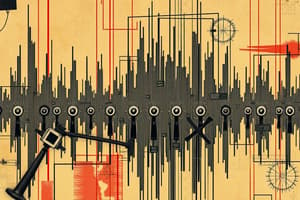Podcast
Questions and Answers
What term is used to describe the integration of electronics with mechanical systems?
What term is used to describe the integration of electronics with mechanical systems?
Which of the following is a key component of many household appliances?
Which of the following is a key component of many household appliances?
What is the primary function of communication systems in electrical engineering?
What is the primary function of communication systems in electrical engineering?
Which of the following is NOT mentioned as an example of a communication system?
Which of the following is NOT mentioned as an example of a communication system?
Signup and view all the answers
What happens when the airbags in a vehicle deploy according to the discussed systems?
What happens when the airbags in a vehicle deploy according to the discussed systems?
Signup and view all the answers
What type of computers are integrated into products like household appliances and automobiles?
What type of computers are integrated into products like household appliances and automobiles?
Signup and view all the answers
What impact do communication systems have on highway design?
What impact do communication systems have on highway design?
Signup and view all the answers
What major area of electrical engineering involves processing and storing information digitally?
What major area of electrical engineering involves processing and storing information digitally?
Signup and view all the answers
What is the fundamental tool used by electrical engineers?
What is the fundamental tool used by electrical engineers?
Signup and view all the answers
Which chapters of this book focus on circuits?
Which chapters of this book focus on circuits?
Signup and view all the answers
What skill is emphasized for engineers to enhance their versatility?
What skill is emphasized for engineers to enhance their versatility?
Signup and view all the answers
In which chapters is the focus on digital systems and embedded computers?
In which chapters is the focus on digital systems and embedded computers?
Signup and view all the answers
Why might electrical engineers be considered fortunate compared to other engineers?
Why might electrical engineers be considered fortunate compared to other engineers?
Signup and view all the answers
What is likely to be an increasingly important aspect of engineering products?
What is likely to be an increasingly important aspect of engineering products?
Signup and view all the answers
What type of devices do engineers most likely need to employ as mentioned in the book?
What type of devices do engineers most likely need to employ as mentioned in the book?
Signup and view all the answers
Which chapters cover electronic devices and circuits?
Which chapters cover electronic devices and circuits?
Signup and view all the answers
What is the correct equation for Node a according to Kirchhoff's Current Law?
What is the correct equation for Node a according to Kirchhoff's Current Law?
Signup and view all the answers
According to Kirchhoff's Current Law, how should the currents be balanced at Node b?
According to Kirchhoff's Current Law, how should the currents be balanced at Node b?
Signup and view all the answers
What would happen if Kirchhoff's Current Law were violated at a node?
What would happen if Kirchhoff's Current Law were violated at a node?
Signup and view all the answers
What is the equivalent statement of Kirchhoff's Current Law?
What is the equivalent statement of Kirchhoff's Current Law?
Signup and view all the answers
If at Node c, $i5 + i6 + i7 = 0$, what does this imply?
If at Node c, $i5 + i6 + i7 = 0$, what does this imply?
Signup and view all the answers
What must the sum of the powers for all elements in a circuit equal at a given instant?
What must the sum of the powers for all elements in a circuit equal at a given instant?
Signup and view all the answers
Which equation represents the power relationship in a circuit?
Which equation represents the power relationship in a circuit?
Signup and view all the answers
What does it mean for two circuit elements to be connected in parallel?
What does it mean for two circuit elements to be connected in parallel?
Signup and view all the answers
What happens to the voltages across parallel elements?
What happens to the voltages across parallel elements?
Signup and view all the answers
In the context of Kirchhoff's Voltage Law, what is crucial when analyzing a circuit loop?
In the context of Kirchhoff's Voltage Law, what is crucial when analyzing a circuit loop?
Signup and view all the answers
Which of the following statements regarding circuit elements A and B is correct in Figure 1.26?
Which of the following statements regarding circuit elements A and B is correct in Figure 1.26?
Signup and view all the answers
Which statement accurately describes the relationship between element B and element D in the circuit?
Which statement accurately describes the relationship between element B and element D in the circuit?
Signup and view all the answers
What does canceling the current 'i' in the equation $va i - vb i + vc i = 0$ illustrate?
What does canceling the current 'i' in the equation $va i - vb i + vc i = 0$ illustrate?
Signup and view all the answers
What is the formula used to compute power in the given context?
What is the formula used to compute power in the given context?
Signup and view all the answers
What is the expression for the current i(t) in the example?
What is the expression for the current i(t) in the example?
Signup and view all the answers
What is the total energy transferred, w, as calculated in the example?
What is the total energy transferred, w, as calculated in the example?
Signup and view all the answers
What does a positive energy value indicate about the energy in the circuit?
What does a positive energy value indicate about the energy in the circuit?
Signup and view all the answers
What does the prefix 'kilo' represent in electrical measurements?
What does the prefix 'kilo' represent in electrical measurements?
Signup and view all the answers
In the given example, what is the voltage v(t)?
In the given example, what is the voltage v(t)?
Signup and view all the answers
What is the form of the power function p(t) according to the calculations?
What is the form of the power function p(t) according to the calculations?
Signup and view all the answers
Which of the following correctly represents a milliampere?
Which of the following correctly represents a milliampere?
Signup and view all the answers
How is electrical current defined in relation to charge flow?
How is electrical current defined in relation to charge flow?
Signup and view all the answers
What does a constant current of one ampere indicate?
What does a constant current of one ampere indicate?
Signup and view all the answers
In the context of current, how is positive charge crossing the reference direction counted?
In the context of current, how is positive charge crossing the reference direction counted?
Signup and view all the answers
What does the equation $i(t) = \frac{dq(t)}{dt}$ represent?
What does the equation $i(t) = \frac{dq(t)}{dt}$ represent?
Signup and view all the answers
Which variable represents the initial time at which charge is known in the equation for charge?
Which variable represents the initial time at which charge is known in the equation for charge?
Signup and view all the answers
What is the role of negative charge crossing in the reference direction?
What is the role of negative charge crossing in the reference direction?
Signup and view all the answers
To find charge from current, what mathematical operation must be performed?
To find charge from current, what mathematical operation must be performed?
Signup and view all the answers
What does $q(t)$ represent in the equation for charge?
What does $q(t)$ represent in the equation for charge?
Signup and view all the answers
Study Notes
Electrical Engineering Overview
- Electrical engineers design systems with two primary goals: managing and distributing information, and converting energy forms.
- Information and energy manipulation are often intertwined within electrical systems.
- Examples of this intersection include weather forecasting where data from satellites and sensors are processed by computers and climate prediction methods.
- Electrical power plants convert various energy sources to electricity.
- Electrical distribution networks transmit this energy to buildings and homes where electrical energy transforms to other forms such as mechanical energy, heat, and light.
- Mechatronics combines electrical and mechanical systems, making modern products feature more complex electronic circuitry.
- Automobiles have increasing amounts of electronics, providing more functionality at lower costs.
Subdivisions of Electrical Engineering
- Communication Systems: Transport information in electrical form, e.g., phones, the internet, radio, satellite TV.
- Computer Systems: Process and store information digitally, used in household appliances and automobiles.
- Control Systems: Gather and control physical processes using sensors and electrical energy. An example is home heating/cooling systems. Control of precise measurements and actions are achieved using control systems in manufacturing.
- Electromagnetics: Study and use of electric and magnetic fields. Microwave ovens, magnetrons, and some manufacturing processes use electromagnetics.
- Electronics: Study and application of materials, devices, and circuits to amplify and switch electrical signals. Transistors are a major example of an electronic device.
- Photonics: Uses light instead of electrons, promising improved communication, computing, signal processing, and sensing devices. Fiber-optic communication systems, are a practical application of photonics.
- Power Systems: Convert and transport energy over long distances. Generators, transformers, distribution lines, and motors are part of power systems.
- Signal Processing: Works with electrical signals and data interpretation for useful information. Signal processing is used in machine vision for robots and controlling the ignition in internal combustion engines.
Circuits, Currents, and Voltages
- Circuit: A closed path of conductors connected to different circuit elements, enabling current flow. The flow of charge creates a current.
- Voltage: A measure of energy gained or lost by a unit charge as it moves through an element (e.g., battery). It's measured in volts. Positive implies energy transfer.
- Current: The rate of charge flow (e.g., electrons) through a wire in amperes (A).
- Electrical current: The flow of charge through a conductor expressed in amperes.
- Reference direction: Selected to define positive charge flow either in, or, out of a point.
- Direct Current (DC): Constant flow in one direction over time.
- Alternating Current (AC): Current that periodically reverses direction, a common example is the AC electrical current supplying houses.
Studying That Suits You
Use AI to generate personalized quizzes and flashcards to suit your learning preferences.
Related Documents
Description
This quiz covers key concepts in electrical engineering, focusing on the integration of electronics with mechanical systems and the functionality of communication systems. Questions include applications in household appliances and the role of digital systems. Test your knowledge and understanding of essential engineering principles and practices.




